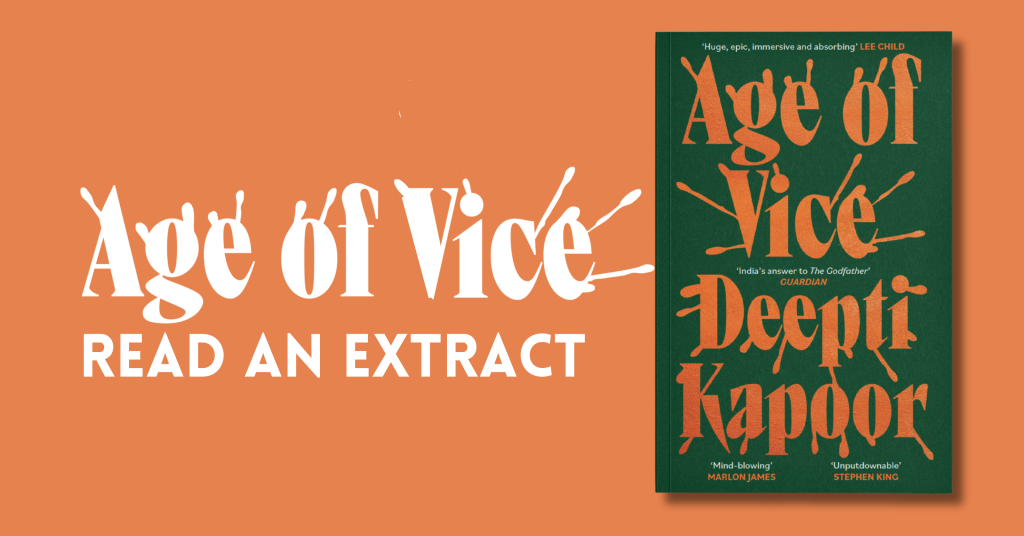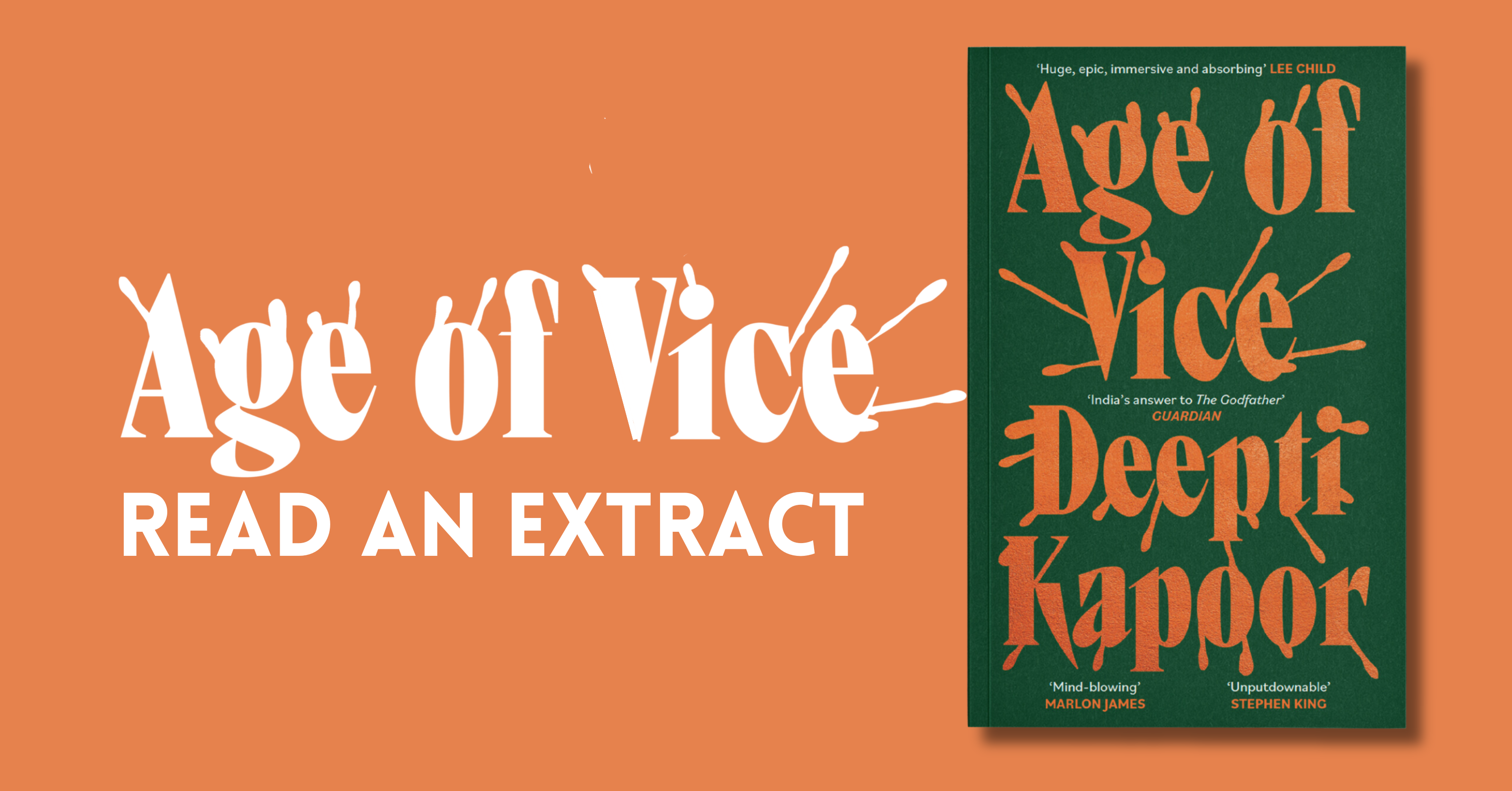Read an extract from Age of Vice by Deepti Kapoor

New Delhi, 2004
Five pavement-dwellers lie dead at the side of Delhi’s Inner Ring Road.
It sounds like the start of a sick joke.
If it is, no one told them.
They die where they slept.
Almost.
Their bodies have been dragged ten meters by the speeding Mercedes that jumped the curb and cut them down.
It’s February. Three a.m. Six degrees.
Fifteen million souls curl up in sleep.
A pale fog of sulfur lines the streets.
And one of the dead, Ragini, was eighteen years old. She was five months pregnant at the time. Her husband, Rajesh, twenty-three, was sleeping by her side. Both belly‑up, tucked in with heavy shawls at the crown and feet, looking like corpses anyway save the telltale signs, the rucksack beneath the head, the sandals lined up neatly beside the arms.
A cruel twist of fate: this couple arrived in Delhi only yesterday. Taking refuge with Krishna, Iyaad, and Chotu, three migrant laborers from the same district in Uttar Pradesh. Each day these men woke before dawn to trek to the labor mandi at Company Bagh, trying to grab whatever daily wage they could find—dhaba cook, wedding waiter, construction laborer—sendingmoney back to their village, paying for a sister’s shaadi, a brother’s schooling, a father’s nightly medicine. Living day to day, hour to hour, the working poor, struggling to survive. Returning to sleep in this barren spot after dark, beside the Ring Road, close to Nigambodh Ghat. Close to the demolished slums of the Yamuna Pushta that had been their home.
But the newspapers don’t dwell on these three men. Their names vanish at dawn with the stars.
A police van with four cops inside arrives at the crash site. They climb out and see the dead bodies, and the wailing, angry crowd that now surrounds the car. There’s someone still inside! A young man, sitting bolt upright, arms braced at the wheel, eyes shut tightly. Is he dead? Did he die like that? The cops push the rabble aside and peer in. “Is he sleeping?” one cop says to his colleagues. These words cause the driver to turn his head and, like some monster, open his eyes. The cop looks back and almost jumps in fright. There’s something grotesque about the driver’s smooth, handsome face. His eyes are leering and wild, but other than that, there’s not a hair out of place. The cops pull open the door, wave their lathis thunderously, order him out. There’s an empty bottle of Black Label at his feet. He’s a lean man, gym honed, wearing a gray gabardine safari suit, hair parted millimeter fine, impeccably oiled. Beneath the reek of whisky there’s another scent: Davidoff Cool Water, not that these cops know.
What they know is this: he’s not a rich man, not a rich man at all, rather a facsimile, a man dressed in the imitation of wealth: in its service. The clothes, the well-groomed features, the car, they cannot hide the essential poverty of his birth; its smell is stronger than any liquor or cologne.
Yes, he’s a servant, a chauffeur, a driver, a “ boy.”
A well-fed and housebroken version of what lies dead on the road.
And this is not his Mercedes.
Which means he can be hurt.
He sobs in oblivion as the cops drag him out. Bent double, he vomits on his own loafers. One cop hits him with his lathi, hauls him up. Another searches his body, finds his wallet, finds an empty shoulder holster, finds a matchbook from a hotel called the Palace Grande, finds a money clip holding twenty thousand rupees.
Whose car is this?
Where did the money come from?
Who did you steal it from?
Thought you’d go for a joyride?
Whose liquor is it?
Chutiya, where’s the gun?
Fucker, who do you work for?
In his wallet there’s an election card, a driver’s license, three hundred rupees. His cards say he is Ajay. His father’s name is Hari. He was born January 1, 1982.
And the Mercedes? It is registered to one Gautam Rathore.
The cops confer: the name sounds familiar. And the address—Aurangzeb Road— speaks for itself. Only the rich and the powerful live there.
“Chutiya,” an officer barks, holding up the car’s papers. “Is this your boss?”
But this young man called Ajay is too drunk to speak.
“Asshole, did you take his car?”
One of the cops walks to the side and looks down at the dead. The girl’s eyes are open, skin already blue in the cold. She is bleeding from the space between her legs, where life has been.
In the station Ajay is stripped and left naked in a cold and windowless room. He’s so drunk he passes out. The constables return to throw icy water over him and he wakes with a scream. He is seated, and they press his shoulders against the wall, pull his legs apart. A female constable stands on his thighs until his circulation goes and he roars in pain and passes out once more.
By the next day the case has gained traction. The media is appalled. At first it’s about the pregnant girl. News channels mourn her. But she was neither photogenic nor full of promise. So the focus shifts to the killer. A source confirms the car is a Mercedes registered to Gautam Rathore, and this is news—he’s a fixture of the Delhi social scene, a polo player, a raconteur, and a prince, genuine royalty, the first and only son of a member of Parliament, Maharaja Prasad Singh Rathore. Was Gautam Rathore driving? That’s the question on everyone’s lips. But no, no, his alibi is watertight. He was holidaying away from Delhi last night. He was at a fort palace hotel near Jaipur. His current location is unknown. But he has released a statement expressing his horror, sending his condolences to the deceased and their kin. The driver, his statement reveals, only recently began working for him. He seems to have taken the Mercedes without Gautam’s knowledge. Taken whisky and the Mercedes and gone for an illicit spin.
A statement from the police confirms as much: Ajay, employee of Gautam Rathore, stole a bottle of whisky from Rathore’s home while his employer was away, took the Mercedes for a joyride, lost control.
This story becomes fact.
It settles in the papers.
And the FIR is registered.
Ajay, son of Hari, is booked under Section 304A of the Indian Penal Code. Death due to negligence. Maximum sentence: two years.
He is sent to the crowded courthouse and presented to the district magistrate, the magistrate takes two minutes to send him to judicial custody with no consideration of bail. He is driven with the other prisoners on a bus to Tihar Jail. They are lined up for processing; they sit in sullen rows on wooden benches in the reception hall, surrounded by placards with rules hammered into the damp, pockmarked plaster of the walls. When his turn arrives, he’s taken into a cramped office where a clerk and a prison doctor with their typewriter and stethoscope await. His possessions are laid out once more: wallet, money clip containing twenty thousand rupees, the book of matches bearing the name Palace Grande, the empty shoulder holster. The money is counted.
The clerk takes his pencil and begins to fill out the form.
“Name?”
The prisoner stares at them.
“Name?”
“Ajay,” he says, barely audible.
“Father’s name?”
“Hari.”
“Age?”
“Twenty- two.”
“Occupation?”
“Driver.”
“Speak up.”
“Driver.”
“Who is your employer?”
The clerk looks over his glasses.
“What is the name of your employer?”
“Gautam Rathore.”
Ten thousand rupees are taken from his money, the rest is handed back to him.
“Put it in your sock,” the clerk says.
He is processed and sent to Jail No. 1, led through the courtyard to the barracks, taken along the dank corridor to a wide cell where nine other inmates live crowded and packed. Clothes hang from the cell bars like in a market stall, and the floor inside is covered with tattered mattresses, blankets, buckets, bundles, sacks. A small squatting latrine in the corner. Though there’s no room left, the warden orders a small space to be cleared out for him on the cold floor next to the latrine. But no mattress can be spared. Ajay lays the blanket he’s been given on the stone floor. He sits with his back to the wall, staring vacantly ahead. A few of his cellmates come and tell him their names, but he says nothing, acknowledges nothing. He curls into a ball and sleeps.
Out into the courtyard, break time. Hundreds of inmates piling out of their cells to congregate. Men size him up. He’s something of a celebrity. They’ve all heard about the Mercedes Killer. They want a closer look, judge for themselves his innocence or guilt, see how tough he is, how scared, decide where he could belong. It only takes a minute to recognize he’s one of the innocent, a scapegoat for a wealthy boss. Men try to prize this truth from him. What was he promised to take the fall? Something sweet? Money, when he gets out? Or will his sons and daughters be sent through school? Or did it come from the other side? Was his family threatened? Was his life in danger? Or was he just loyal?
He imagines the end. Everything he is and all he’s done. But no. The next morning, the door is opened, new guards enter. They tell him to come with them. He’ll shower first. He’s shivering naked and raw. When they approach, he curls his fists, back to the wall, to fight. They laugh and throw him fresh clothes.
He’s taken to the warden’s office. A pleasing spread: freshly cut fruit, paratha, lassi. A vision of paradise. The warden asks him to sit. “Have a cigarette. Help yourself. There’s been a mistake. I wasn’t told,” he says,“If I’d been told, this would never have happened. Really, no one knew, not even your friends. But things will be different. You’ll be taken to your friends here now. You’ll be free, within reason. Oh, and this money, it’s yours. You should have said something. You should have made it clear. You should have let us know. Why didn’t you let us know?”
Ajay stares at the food, at the cigarette pack.
“Know what?”
The warden smiles.
“That you’re a Wadia man.”
Age of Vice by Deepti Kapoor
OUT NOW IN PAPERBACK







